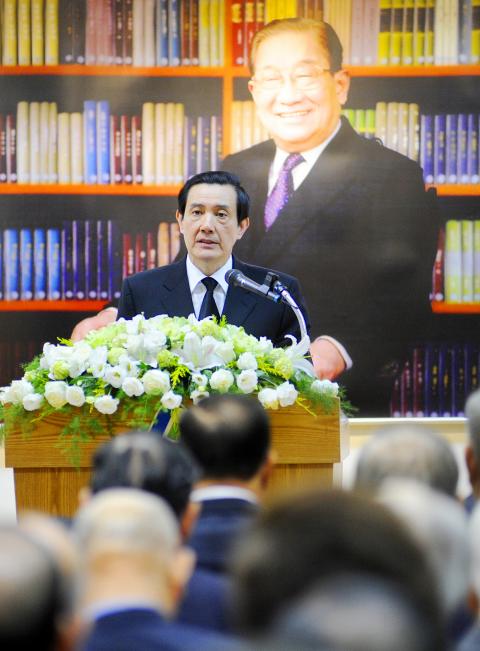President Ma Ying-jeou (馬英九) yesterday said that when he worked for then-Chinese Nationalist Party (KMT) secretary-general Lee Huan (李煥), both of them were branded as “Red Guards” because they were trying to push for major political reforms.
At a memorial for Lee, who died on Dec. 2 at the age of 93, Ma reflected on the days when the late KMT leader and government official was his boss.
Their main duties at the time were to prepare for the lifting of martial law, to allow for the formation of political parties and to replace a whole generation of National Assembly members, Ma said.

PHOTO: GEORGE TSORNG, TAIPEI TIMES
Ma said that because the later task affected many senior politicians, he and Lee were criticized and labeled “Red Guards” — a name drawn from the forces unleashed by former Chinese Communist Party leader Mao Zedong (毛澤東) to purge his political enemies in China during the Cultural Revolution from 1966 to 1976.
Ma praised Lee for contributing greatly to the process of retiring senior members of the National Assembly, amending the Constitution and pushing through other political reforms.
Acting on a directive by then-president Chiang Ching-kuo (蔣經國), Lee also worked in particular to cultivate Taiwan-born politicians, which was a major achievement that helped “build energy” for further political development, Ma said.
“It is necessary to illustrate Lee’s important role in helping to achieve the Republic of China’s transition to democracy,” Ma said.
The president issued a special citation in honor of Lee, which was accepted by Lee Ching-chung (李慶中), Lee Huan’s eldest son.
Lee Huan was born in Hubei Province, China, on Sept. 24, 1917. In addition to his KMT party posts, he served as education minister and premier before retiring.
Honoring his wishes for no altars, public mourning, condolence committees, obituaries or funeral services, his children held a “non-funeral service” yesterday.
Although it was an informal gathering, it was attended by a number of prominent politicians, including Legislative Speaker Wang Jin-pyng (王金平), Examination Yuan President John Kuan (關中), former KMT chairmen Lien Chan (連戰) and Wu Po-hsiung (吳伯雄), as well as New Party Chairman Yok Mu-ming (郁慕明).

Alain Robert, known as the "French Spider-Man," praised Alex Honnold as exceptionally well-prepared after the US climber completed a free solo ascent of Taipei 101 yesterday. Robert said Honnold's ascent of the 508m-tall skyscraper in just more than one-and-a-half hours without using safety ropes or equipment was a remarkable achievement. "This is my life," he said in an interview conducted in French, adding that he liked the feeling of being "on the edge of danger." The 63-year-old Frenchman climbed Taipei 101 using ropes in December 2004, taking about four hours to reach the top. On a one-to-10 scale of difficulty, Robert said Taipei 101

A preclearance service to facilitate entry for people traveling to select airports in Japan would be available from Thursday next week to Feb. 25 at Taiwan Taoyuan International Airport, Taoyuan International Airport Corp (TIAC) said on Tuesday. The service was first made available to Taiwanese travelers throughout the winter vacation of 2024 and during the Lunar New Year holiday. In addition to flights to the Japanese cities of Hakodate, Asahikawa, Akita, Sendai, Niigata, Okayama, Takamatsu, Kumamoto and Kagoshima, the service would be available to travelers to Kobe and Oita. The service can be accessed by passengers of 15 flight routes operated by

Taiwanese and US defense groups are collaborating to introduce deployable, semi-autonomous manufacturing systems for drones and components in a boost to the nation’s supply chain resilience. Taiwan’s G-Tech Optroelectronics Corp subsidiary GTOC and the US’ Aerkomm Inc on Friday announced an agreement with fellow US-based Firestorm Lab to adopt the latter’s xCell, a technology featuring 3D printers fitted in 6.1m container units. The systems enable aerial platforms and parts to be produced in high volumes from dispersed nodes capable of rapid redeployment, to minimize the risk of enemy strikes and to meet field requirements, they said. Firestorm chief technology officer Ian Muceus said

MORE FALL: An investigation into one of Xi’s key cronies, part of a broader ‘anti-corruption’ drive, indicates that he might have a deep distrust in the military, an expert said China’s latest military purge underscores systemic risks in its shift from collective leadership to sole rule under Chinese President Xi Jinping (習近平), and could disrupt its chain of command and military capabilities, a national security official said yesterday. If decisionmaking within the Chinese Communist Party has become “irrational” under one-man rule, the Taiwan Strait and the regional situation must be approached with extreme caution, given unforeseen risks, they added. The anonymous official made the remarks as China’s Central Military Commission Vice Chairman Zhang Youxia (張又俠) and Joint Staff Department Chief of Staff Liu Zhenli (劉振立) were reportedly being investigated for suspected “serious